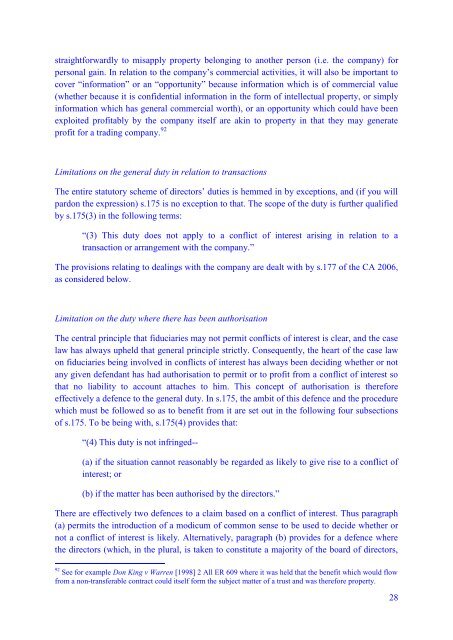Chapter 7 Directors' Duties - alastairhudson.com
Chapter 7 Directors' Duties - alastairhudson.com
Chapter 7 Directors' Duties - alastairhudson.com
You also want an ePaper? Increase the reach of your titles
YUMPU automatically turns print PDFs into web optimized ePapers that Google loves.
straightforwardly to misapply property belonging to another person (i.e. the <strong>com</strong>pany) for<br />
personal gain. In relation to the <strong>com</strong>pany‟s <strong>com</strong>mercial activities, it will also be important to<br />
cover “information” or an “opportunity” because information which is of <strong>com</strong>mercial value<br />
(whether because it is confidential information in the form of intellectual property, or simply<br />
information which has general <strong>com</strong>mercial worth), or an opportunity which could have been<br />
exploited profitably by the <strong>com</strong>pany itself are akin to property in that they may generate<br />
profit for a trading <strong>com</strong>pany. 92<br />
Limitations on the general duty in relation to transactions<br />
The entire statutory scheme of directors‟ duties is hemmed in by exceptions, and (if you will<br />
pardon the expression) s.175 is no exception to that. The scope of the duty is further qualified<br />
by s.175(3) in the following terms:<br />
“(3) This duty does not apply to a conflict of interest arising in relation to a<br />
transaction or arrangement with the <strong>com</strong>pany.”<br />
The provisions relating to dealings with the <strong>com</strong>pany are dealt with by s.177 of the CA 2006,<br />
as considered below.<br />
Limitation on the duty where there has been authorisation<br />
The central principle that fiduciaries may not permit conflicts of interest is clear, and the case<br />
law has always upheld that general principle strictly. Consequently, the heart of the case law<br />
on fiduciaries being involved in conflicts of interest has always been deciding whether or not<br />
any given defendant has had authorisation to permit or to profit from a conflict of interest so<br />
that no liability to account attaches to him. This concept of authorisation is therefore<br />
effectively a defence to the general duty. In s.175, the ambit of this defence and the procedure<br />
which must be followed so as to benefit from it are set out in the following four subsections<br />
of s.175. To be being with, s.175(4) provides that:<br />
“(4) This duty is not infringed--<br />
(a) if the situation cannot reasonably be regarded as likely to give rise to a conflict of<br />
interest; or<br />
(b) if the matter has been authorised by the directors.”<br />
There are effectively two defences to a claim based on a conflict of interest. Thus paragraph<br />
(a) permits the introduction of a modicum of <strong>com</strong>mon sense to be used to decide whether or<br />
not a conflict of interest is likely. Alternatively, paragraph (b) provides for a defence where<br />
the directors (which, in the plural, is taken to constitute a majority of the board of directors,<br />
92 See for example Don King v Warren [1998] 2 All ER 609 where it was held that the benefit which would flow<br />
from a non-transferable contract could itself form the subject matter of a trust and was therefore property.<br />
28













